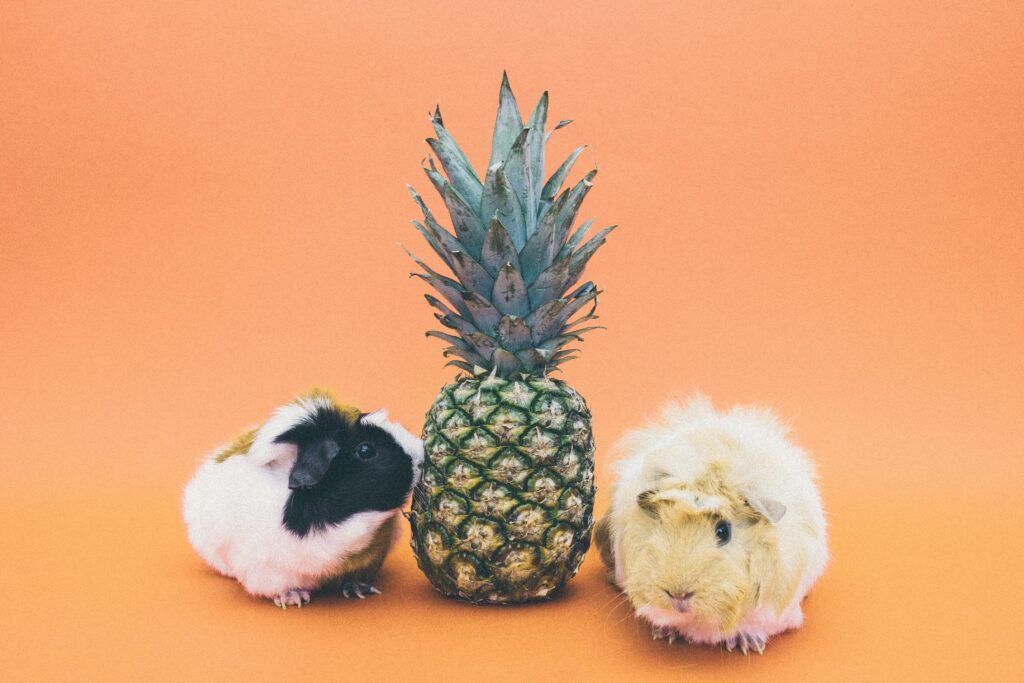As an Amazon Associate we earn from qualifying purchases.
Can guinea pigs eat pineapple? This is a question that many guinea pig owners have, and the answer is yes, cavies can eat pineapple. In fact, fresh pineapple is an excellent addition to their diet, providing them with essential vitamins and nutrients. But it’s important to know how much pineapple to feed your guinea pig and what other considerations to take into account.
So read on to learn everything you need to know about feeding your guinea pig pineapple.
Is Pineapple Safe for Guinea Pigs to Eat?
Can guinea pigs eat pineapple? Yes, they can! However, you should only give them a small amount, as too much can cause them to have an excessive sugar intake and can be bad for their health.

Pineapple is a healthy fruit packed full of Vitamin C and other essential nutrients that can benefit your guinea pig’s health. It is also a good source of dietary fiber, which can help keep their digestive system functioning properly.
When feeding your guinea pig pineapple, make sure to give them only the fleshy part of the fruit and avoid giving them the skin or leaves, as these can contain harmful toxins. You can either give them fresh pineapple or juice it yourself – just make sure that it is 100% pure pineapple juice with no added sugar or other ingredients.
How Much Pineapple Can Guinea Pigs Eat?
As a general rule of thumb, you should only feed your guinea pig a small amount of pineapple at a time. A good starting point is to give them one or two small pieces of fresh pineapple or a few tablespoons of 100% pure pineapple juice. If they seem to enjoy it and don’t have any adverse reactions, you can gradually increase the amount you give them.
As with any new food, it is always best to introduce pineapple to your guinea pig’s diet slowly and in small quantities at first. This will help them get used to the new taste and texture and allow you to monitor their reaction to it.
If you are giving your guinea pig fresh pineapple, make sure that it is ripe but not overripe, as this can cause them digestive upset. It is also important to remove the skin and any seeds from the fruit before feeding it to them.

How Often Should I Feed Pineapple To My Guinea Pig?
You can give your guinea pig pineapple 1-2 times per week. However, it is important to note that too much pineapple can negatively affect their health, so always be sure to monitor their reaction to it. If your guinea pig is still in its infancy, it is best to err on the side of caution and not feed them pineapple at all.
Health Benefits Of Feeding Pineapple To Guinea Pigs
Now that we’ve discussed how often to feed your guinea pig pineapple, let’s talk about the health benefits of this fruit for your pet.
1. Good For Cardiovascular Health
Guinea pigs may eat pineapple as part of a healthy diet to help improve their cardiovascular health. The fiber in pineapple can help keep your guinea pig’s blood vessels healthy and clear of blockages, improving blood flow and reducing heart disease risk.
The low fat and sodium content of pineapple can also help keep your guinea pig’s heart healthy. They help strengthen the heart muscles and keep the heart rhythm regular.
2. Boosts Immunity
The vitamin C in pineapple can help boost your guinea pig’s immunity and help them fight off infection. Vitamin C is an important nutrient for cavies as it helps build collagen, which is essential for healthy skin, bones, and connective tissues.
Pineapple is also a good source of other antioxidants, which can help prevent cell damage. These antioxidants can help keep your guinea pig’s immune system functioning optimally and help them stay healthy.

3. Good For Digestion
The fiber in pineapple can help improve your guinea pig’s digestion and keep its digestive system functioning properly. Vitamin C can also help boost your guinea pig’s metabolism and aid in the digestion of food.
Pineapple is a good source of bromelain, an enzyme that can help break down proteins. This can be beneficial for guinea pigs who have difficulty digesting protein-rich foods.
Pineapple is also a good source of potassium, which can help regulate fluid balance and support healthy nerve and muscle function.
4. Aids In Blood Clotting
One of the benefits of feeding pineapple to guinea pigs is the way that it aids in blood clotting. The vitamin C found in pineapple can help improve the function of platelets, which are the cells responsible for blood clotting. This can help prevent bleeding from small cuts or wounds.
Additionally, the antioxidants found in pineapple can help protect cells from damage, which can help keep the blood vessels healthy and functioning properly. Pineapples are also rich in vitamin K, which is another nutrient that plays a role in blood clotting.
5. Low Calories
When it comes to weight management, one of the benefits of feeding pineapple to guinea pigs is that it is a low-calorie fruit. A single slice of pineapple contains only about 42 calories, making it a good choice for guinea pigs who are trying to lose weight or maintain their current weight.
The fiber in pineapple can help guinea pigs feel full after eating and can help prevent them from overeating. The low calorie and fat content of pineapple can also help guinea pigs stay healthy and avoid gaining weight.
Overall, adding pineapple to your cavy’s diet can provide a host of health benefits, from improved cardiovascular health to boosted immunity to better digestion. So why not add this delicious fruit to your guinea pig’s diet and see the benefits for yourself?
Bottom Line — Can Guinea Pigs Eat Pineapple?
So, can guinea pigs eat pineapple? The answer is a resounding yes. They can enjoy fresh, canned, and dried pineapple without any ill effects on their health or digestive system. You can also serve them the fruit as part of a larger meal for an extra dose of vitamin C to keep your pet healthy and strong!